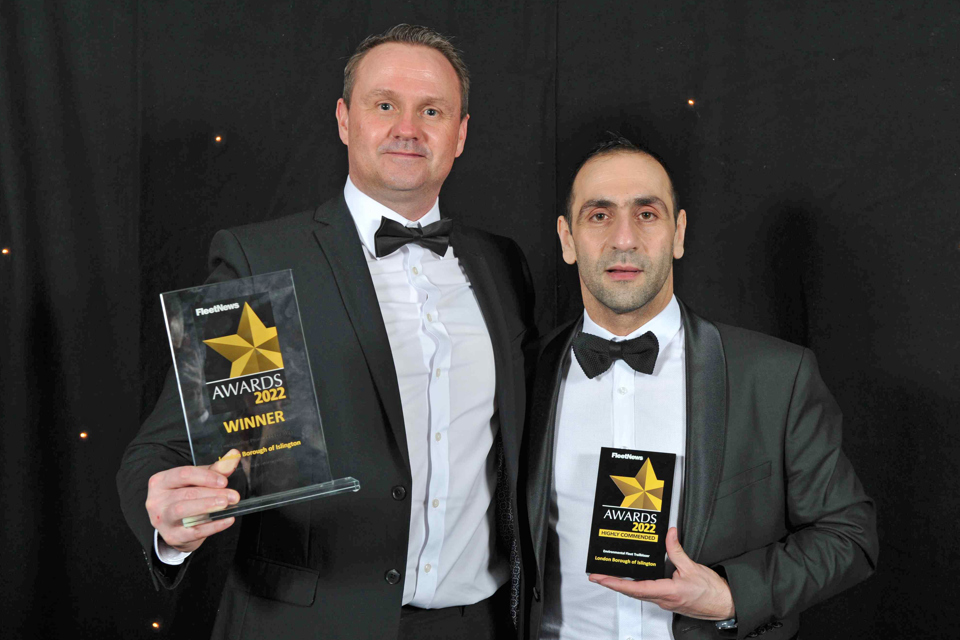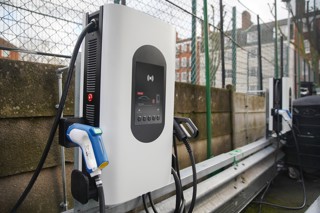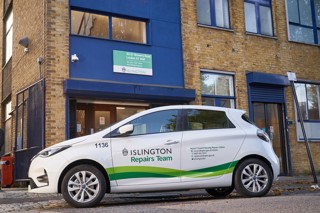Electrifying any fleet poses numerous challenges, but when it is one as diverse as that operated by public sector organisation London Borough of Islington, it brings additional issues.
One of these is finding like-for-like zero-emission alternatives to specialist vehicles, such as those fitted with tail-lifts or other equipment.
However, the council, which has declared a climate emergency, has opted to innovate and take a lead in adopting the technologies.
This approach has seen the local authority, which won the outstanding product of the year category at the Fleet News Awards as well as being highly-commended in the environmental fleet trailblazer section, take on the world’s first refurbished and repowered twin-pack refuse vehicle in October.
The former Dennis Elite 6 diesel vehicle with a Dennis Olympus twin pack body was at the end of its usual five-to-seven year lifecycle, but was retrofitted with electric capabilities.
As well as producing zero emissions, it means the vehicle can now be run for a further 10 years which is in line with the council’s re-use, recycling and circular economy agenda.
Fleet News: How are your electrification plans progressing?
Electrifying any fleet poses numerous challenges, but when it is one as diverse as that operated by public sector organisation London Borough of Islington, it brings additional issues.
One of these is finding like-for-like zero-emission alternatives to specialist vehicles, such as those fitted with tail-lifts or other equipment.
However, the council, which has declared a climate emergency, has opted to innovate and take a lead in adopting the technologies.
This approach has seen the local authority, which won the outstanding product of the year category at the Fleet News Awards as well as being highly-commended in the environmental fleet trailblazer section, take on the world’s first refurbished and repowered twin-pack refuse vehicle in October.
The former Dennis Elite 6 diesel vehicle with a Dennis Olympus twin pack body was at the end of its usual five-to-seven year lifecycle, but was retrofitted with electric capabilities.
As well as producing zero emissions, it means the vehicle can now be run for a further 10 years which is in line with the council’s re-use, recycling and circular economy agenda.
Fleet News: How are your electrification plans progressing?
Chris Demetriou, head of fleet, transport and accessible community transport: We operate 520 vehicles and, currently, we’ve got around 70 electric ones of various shapes and sizes, which is around 17%. Our target is to have half the fleet zero emission by 2025 and all of it fully electric by 2030.
One of the issues we have is similar to what you see elsewhere with really long vehicle lead times, while some manufacturers won’t even take orders at the moment.
FN: How did the idea for the upcycled refuse vehicle come about?
CD: We’ve been trying to prioritise our heavier, more polluting vehicles, like our refuse collection vehicles and buses, but finding replacements for them is awkward.
With ICE (internal combustion engine), you can literally get any vehicle you want. With electric, it’s difficult: for example we’ve got a whole heap of 3.5-tonne vehicles with tail-lifts, but trying to electrify them with the payload is awkward.
We had already taken on two Dennis Eagle eCollect electric refuse collection trucks when we saw that RVS (Refuse Vehicle Solutions), which we already worked quite closely with, had set up a partnership with a Dutch company called Emoss, which provides zero-emission powertrains for heavy machinery.
We spoke with RVS and they said they could convert one of our existing refuse trucks. We got the first vehicle back in October and took on our second one in February. We’ve committed to another four due to the success of these.
As well as the environmental benefits of upcycling, the savings we make by converting an existing vehicle instead of buying a new, purpose-built one helps us get other electric vehicles on the fleet.
I’ve also spent a lot of time badgering manufacturers to see if they can do other specific vehicles for us.
For example, we’ve got a lot of community buses and, although there are a lot of electric buses out there, ones with a high-rise floor and a rear tail-lift are rare, so I’ve convinced (bus manufacturer) Mellor Bus and (bus conversion company) EVM to do us something which will be another UK first.
FN: How are you ensuring you can charge your EVs?
CD: Our main depot is undergoing a big power upgrade. We’ve already got a few 90kW chargers and about half-a-dozen 22kW AC chargers there, but probably by this time next year we’ll have 75 ultra-rapid and rapid chargers on-site.
They will be managed by a smart system so the site will be load balanced. We’ve got other sites with 7kW and 22kW chargers as well, and our cars and vans predominantly use those.
We’re also working on other projects around solar PV (photovoltaic) and energy storage systems, as well as a vehicle-to-grid (V2G) project which runs until December.
Judges’ comments:
LB Islington’s innovative approach to converting a diesel refuse collection lorry to electric can be described as the ultimate in recycling. Judges hailed it as a great lead project that demonstrates what can be achieved and it’s an approach that hopefully, other local authorities will follow.
Login to continue reading.
This article is premium content. To view, please register for free or sign in to read it.























Login to comment
Comments
No comments have been made yet.